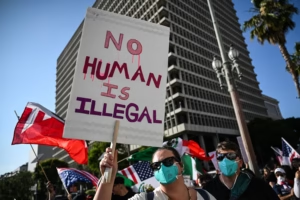Introduction
A federal appeals court issued a ruling on Thursday that postponed an order mandating the Trump administration to relinquish control of the California National Guard back to Governor Gavin Newsom.

This decision comes amid ongoing legal disputes regarding the authority over the state’s military forces, which have been a point of contention between state and federal leadership.
The court’s delay allows for further examination of the legal arguments presented by both sides, as the administration has maintained that federal oversight is necessary for national security reasons. Meanwhile, Governor Newsom has argued that state control is essential for effectively managing local resources and responding to emergencies.
The implications of this ruling could significantly impact the operational dynamics of the California National Guard and the relationship between state and federal authorities moving forward.
Gavin Newsom has provided the administration with a temporary reprieve from what would have been a significant shift in its stance regarding the protests occurring in Los Angeles. This decision comes at a critical juncture, as the administration grapples with the implications of its policies on public demonstrations and the broader social climate.
By intervening at this moment, Newsom has effectively paused the potential for a drastic change that could have alienated certain segments of the population and intensified tensions within the community. The administration now has an opportunity to reassess its approach, engage in dialogue with stakeholders, and consider the long-term ramifications of its policies on civil liberties and public safety.
This reprieve not only reflects the complexities of governance in a politically charged environment but also underscores the importance of strategic decision-making in addressing the concerns of constituents while maintaining order.
On Thursday morning, a federal judge in California granted a temporary restraining order aimed at preventing the deployment of the California National Guard by former President Trump. This legal decision came in response to concerns regarding the potential misuse of state resources and the implications of such military involvement in domestic matters.
The judge’s ruling reflects a growing tension between state and federal authorities, particularly in light of the ongoing debates surrounding the appropriate use of National Guard units. The order underscores the judiciary’s role in mediating conflicts that arise from executive actions, especially those that may overstep legal boundaries or infringe upon state sovereignty.
As the situation develops, it remains to be seen how this ruling will impact the broader discourse on federalism and the balance of power between state and national governments.
During the protests in Los Angeles concerning immigration raids, the deployment of National Guard troops was a significant point of contention. The situation escalated to the extent that control of the Guard was handed back to Governor Gavin Newsom.
Notably, this transfer of authority occurred without his prior consent regarding the activation of the Guard, raising questions about the decision-making processes involved in such deployments.
The involvement of the National Guard in civil protests highlights the complexities and sensitivities surrounding immigration issues, as well as the balance of power between state leadership and military resources in responding to public dissent.
The order is scheduled to take effect at noon on Friday, according to local time. This timing indicates a precise moment when the directives outlined in the order will be implemented, marking a significant transition that may impact various stakeholders involved.
It is essential for all parties to be aware of this deadline to ensure compliance and to prepare for any necessary adjustments that may arise as a result of the order’s enforcement. The local time reference underscores the importance of synchronization among those affected, as differing time zones could lead to confusion if not properly accounted for.
A panel consisting of three judges from the Ninth Circuit Court of Appeals has granted an administrative stay regarding the order issued by the lower court. This decision effectively pauses the enforcement of that order while the appeals process is underway.
Additionally, the panel has scheduled a hearing to take place on June 17, where further arguments and evidence will be presented. This procedural step is significant as it allows for a thorough examination of the case before any final determinations are made, ensuring that all legal considerations are addressed appropriately.
In a post shared on Truth Social on Friday morning, Trump expressed his approval of the recent decision made by the appeals court.
He reiterated his belief that had he not deployed military forces to Los Angeles, the city would have faced catastrophic destruction, suggesting that it would have been engulfed in flames.
This statement underscores his perspective on the critical role of military intervention in maintaining order during times of crisis, reflecting his ongoing narrative about the necessity of strong leadership in turbulent situations.